To set the table so that people feel at home and relaxed; Mr. ISHIKAWA Hiromu, Mr. SHINDO Kazuhiro (JICA Tokyo Restaurant/Tokyo Business Service Co., Ltd.)
On what occasion do you feel that you are living life in your own way?
When I'm feeling happy, because I believe others are also feeling happy then. Mr. ISHIKAWA Hiromu (Left)
When I am able to express myself in dishes. Mr. SHINDO Kazuhiro (Right)
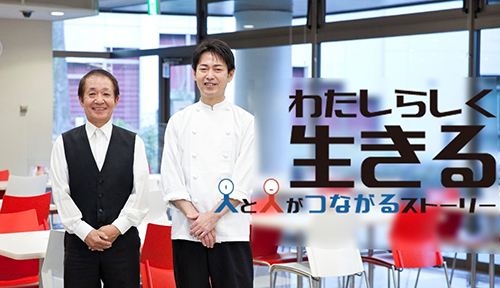
*Interviews were held while implementing infection control precautions. Masks were removed only for the photographs.
JICA is not only engaged in international cooperation abroad, but also implements the Knowledge Co-Creation Program in Japan and accepts participants thereof from developing countries to share knowledge and experience. In this article, we will introduce two persons who work at JICA Tokyo Restaurant. Mr. ISHIKAWA Hiromu, the chief hall staff, is adored by others as a person absolutely necessary for participants, and Mr. SHINDO Kazuhiro, the head chef and chief of restaurant, provides breakfast, lunch, and dinner for participants who work hard every day, in a place far away from their home country.
The role of the restaurant located within the venue of JICA Tokyo
Participants of KCCP who come from developing countries will stay in Japan for at least a week, and for more than two years at most. JICA Tokyo has been accepting around 4,000 participants per year (3,768 in FY2018) from more than 120 developing countries in total.
Participants who arrive at JICA Tokyo place their belongings in a room that will become their living base during their stay in Japan, and then visit JICA Tokyo Restaurant. While the participants wear a strained look with the thought that they are representing their home country or are anxious about the KCCP session that will begin shortly, Mr. ISHIKAWA Hiromu, who is loved by all participants like their own father, greets them at the restaurant with a big smile.
Relationship that allows us to talk about what happened today during the meal
"What do you think is the moment a person becomes most serious during the day?" asks Mr. Ishikawa, who has been in charge of serving at JICA Tokyo Restaurant for a long time.
"Don't you become serious whenever you are thinking about what are you going to eat today, or about food in general? I believe food is the most important factor for human beings. That is why I hope that people become relaxed, feel reassured, and enjoy themselves while having meals," he says. When Mr. Ishikawa meets a participant for the first time, he asks where the person is from, pulls out a phrase stored inside his head, and says "Hello, how are you?" in that person's language with a smile. The participant's stiff and nervous expression instantly turns into a big smile too at hearing their own language, and a conversation begins.
Mr. Ishikawa goes around each table during the meal, and occasionally talks to a participant who is showing a poor appetite and asks why he/she is not eating the food. "I try to have a conversation with them, even briefly. That will make their heart open up little by little. I try to have a family-style relationship, so that they can eat in a relaxed and reassured mood," he says.
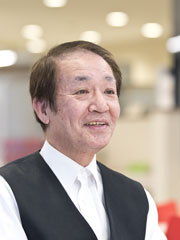
After gaining experience in the restaurants and bars of hotels, Mr. Ishikawa became a staff member of JICA Tokyo Restaurant 16 years ago. He likens his way of living to a marathon, his hobby, and says, "You should stand in your belief without being swayed by others, and keep on running at your own pace."
"Participation in KCCP in Japan has been limited due to travel restrictions as a result of the COVID-19 pandemic. My memories went all rusty during that time. Now I am reviewing my collection of notes on different languages so that I can welcome the guests anytime. You have to dust away the cobwebs to open up your mind." Mr. Ishikawa believes that you need various miscellaneous knowledge to establish a conversation, regardless of language or culture, and keeps studying for the "family" coming to the restaurant.
Participants treat Mr. Ishikawa like a member of their own family as well. There was a participant from the Philippines who took pictures with him to introduce him as her "father" in Japan to family back in her country. There are participants beginning conversations with "Tadaima (I'm back)" or "Okaeri (welcome back)" with Mr. Ishikawa before having dinner. Once, Mr. Ishikawa was hugged from behind when he was working. Surprised and turning around, he found a smiling Mexican participant who returned to Japan for another training session.
Building up a body that doesn't tire easily to work comfortably
Mr. Ishikawa confesses with a smile that when he started working at JICA Tokyo Restaurant, he was motivated that this must be a workplace where he could fully exert the experience he had gained until then, all the more because it would be tough work, and as a result, now he enjoys working at the restaurant more than anyone else.
"I'm thinking that this workplace is a performance stage for me. It may be difficult to fully satisfy the guests, but I try to come near to that point as much as possible. When I go out into the hall from the backyard, I flip my switch and tell myself that now I am on stage. I believe that if I work comfortably, the guests can enjoy the meal comfortably too."
Mr. Ishikawa says that the key to work comfortably is to build up a body that doesn't tire easily, by enjoying marathons, which is his hobby.
"When you are running a marathon, you feel your head becoming light. A new idea comes up to your empty mind, like how about showing calories on the menu, or I should find out where halal food(*) is sold, which I expect that participants will ask me about. I feel at ease then and get ready for the next day. Since I started marathon running, I don't feel weary after a day's work." He says that he often invites participants to join in jogging nearby, or try running inside the gym.
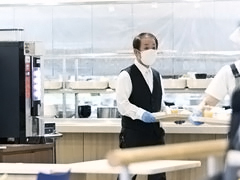
Mr. Ishikawa, whom participants meet almost every day during their KCCP sessions, cheerfully says, "I communicate with them in English, but sometimes I can't respond promptly in English even I understand what they are saying. We all have different native languages, so we generally communicate based on our own nuances."
We asked Mr. Ishikawa what makes him happy the most about this job.
"It's the time when I see participants tackling the training tasks well after about a week from arrival. That's when I can feel reassured that they are eating well. You can't do anything without eating properly." He is surely like a father, caring about the participants kindly.
* Halal food is food that is acceptable for Muslims.
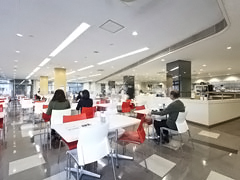
JICA Tokyo Restaurant is open also to the public. Many customers visit the restaurant at lunchtime, to enjoy their favorite foreign traditional dishes and the wide variety of dishes, and above all, delicious foods that makes you feel reassured.
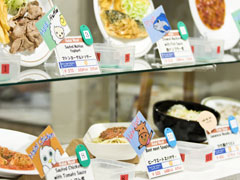
There is a wide-ranging menu with easy-to-understand explanations and illustrations, such as "halal chicken," "halal beef," "vegetables," "fish," etc.
We want to be a restaurant that makes you feel like you have come home
When participants have seats at the table, Mr. Ishikawa and other hall staff bring the steaming-hot meals to the table. At lunchtime, a maximum of about 300 guests arrive, and sometimes there is a long queue.
Mr. Shindo, the chief of the restaurant, is responsible for the entire operation of the restaurant. He is in charge of the management of the restaurant, but he also works in the kitchen or serves in the hall. Participants basically eat breakfast, lunch, and dinner at the restaurant, for more than two weeks. "I want to serve dishes familiar to them so that they can feel relaxed at the restaurant, like they have come home after the KCCP session of the day. Of course, just like Japanese dishes that are finished in different types of flavors according to each local region, or even prepared in different ways and tastes depending on the household, it is difficult to provide something ‘just right' for everyone, but I try to make the dishes taste familiar to them as much as possible." Dishes made by Mr. Shindo are ordinary home-made style foods, set out with special care.
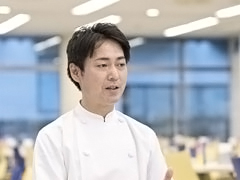
Mr. Shindo started his career at JICA Tsukuba. After working at restaurants in JICA Global Plaza and in JICA Yokohama, while also being in charge of the restaurant in city hall and studying management at the headquarters of the company he still belongs to now, he assumed his current post of JICA Tokyo Restaurant Chief in 2017.
Tokyo Business Service, a company that Mr. Shindo belongs to, operates several restaurants in JICA offices throughout Japan. Mr. Shindo joined the company 25 years ago, and has been engaged in work for JICA restaurants for more than 20 years in total. His first workplace was JICA Tsukuba.
Wanting to be like his elder cousin who worked as a chef in a hotel, Mr. Shindo started working in the restaurant business. However, because restaurants in JICA are visited by guests from various countries, special dishes that clear certain religious restrictions are also served. He says that learning how to work when he was newly employed was tough, but he recalls those days with a smile, saying, "I learned there that mistakes are never allowed, so as to protect the dietary life of various guests and provide them a place to spend time comfortably, regardless of what is taken for granted in Japan."
For example, even in the case of Japanese dishes, the restaurant uses traditional Japanese ingredients like shoyu and miso that are not suitable for Halal food. Therefore they prepared special shoyu and miso so that they are acceptable in religious terms for Muslims to eat. They also separate the cooking utensils used for halal foods. The kitchen of the restaurant works enthusiastically to ensure that participants from any country feel at home.
Always try to serve dishes of the home countries of participants staying and dishes that can trigger conversation
"I hear about the participants currently staying from Mr. Ishikawa, and try to provide dishes of their home countries before they ask. I get information from the staff members of JICA, or try to provide a dish that became a popular topic."
Mr. Shindo says that in order to make the guests relaxed in the restaurant during their meals, you must be able to serve dishes of any country in general, instead of recommending a certain dish of the country you know well. He knows the importance of flexible service from his experience of serving various guests since the time he started working. He has been making more than 200 kinds of dishes up to now.
During the year end and new-year holidays about 20 years ago, a participant from Africa stayed alone in JICA Tsukuba, and Mr. Shindo was in charge of making his breakfast, lunch, and dinner all by himself. "It was a very practical experience of having communication through meals," recalls Mr. Shindo. When Mr. Shindo asked, "What do you want to eat tomorrow?" with his beginner's English, there came back a simple answer of "chicken." So, having free reign to decide the cooking method, he fully exerted his skill. Soon after the meal was finished, the participant came to the counter, and they had a casual conversation about their favorite TV programs, just like a conversation in any ordinary family, and that continued every day after each meal thereafter. That was the starting point of his philosophy about working at the JICA Tokyo Restaurant, offering a place where the guests feel like they have come back home.
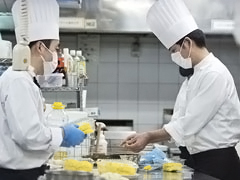
"Making dishes of other countries does take time and effort, but there are discoveries and enjoyment every time, for example, using vegetables that are usually used as a garnish in Japanese dishes as seasoning."
Mr. Shindo says with a gentle smile, "What I value the most in cooking is to do it freely, with a good sense. Cooking procedures in JICA Tokyo are predetermined to a certain degree in terms of foodstuff, cooking method, and seasoning, for the sake of recipe or for religious reasons. However, based on such general rules, I enjoy adding my own taste by slightly arranging the method, flavor, and decoration." Mr. Ishikawa, Mr. Shindo, and other staff members of the restaurant are providing a heartwarming place and dishes every day.
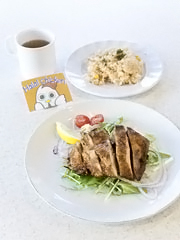
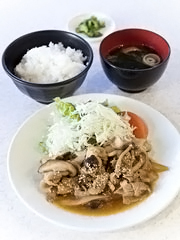
Mr. Shindo asks the senior colleagues when he was working in JICA Tsukuba for a recommended dish when participants from different countries are staying, or borrows ideas from multinational recipes of the company he belongs to, to offer the weekly menu of various countries throughout the year. On the day the interview was held, for instance, there were three kinds of lunch set menu. Lunch set A (halal): Cajun chicken and jambalaya-style pilaf (dishes of Louisiana, U.S.A.), with soup; Lunch set B: Japanese dishes of pork and mushrooms sauteed with Japanese barbeque sauce, with rice and miso soup; Lunch set C (halal): Green coconut curry with chicken and mushroom, with mini-salad and soup.
Ms. MIKAMI Yoshiko (JICA Tokyo Restaurant/Tokyo Business Service)
I have been working at the JICA Tokyo Restaurant for about 25 years. Since I started here, the scene of participants attending the closing ceremony of KCCP in their traditional clothing has always been so beautiful, and you can feel their pride of coming to Japan representing their own country. Such participants come to the restaurant looking nervous for the first time, but Mr. Ishikawa is really good at letting them smoothly open up their heart. I see him asking the participants like "Is there any greeting phrase that can be used for any time of the day?" and taking notes, or making proposals like changing the way the menu is shown. You can tell that he is always thinking about the guests. That is why he is loved by every participant, and I am often asked "Isn't Ishikawa-san here today?"
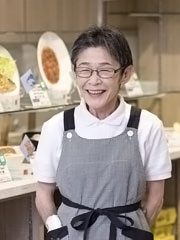
Mr. Shindo always pays attention so that the work of staff like us goes smoothly, and his manner of doing so is always gentle. I think the dishes he prepares show his personality; they are always set out prettily and cute, and the dishes taste tender and mild. He responds instantly whenever there is an idea on how to improve a pop-up from Mr. Ishikawa. He also takes care so that the staff can work easily. He is always making effort so that the restaurant becomes a comfortable place for both participants and the working staff.
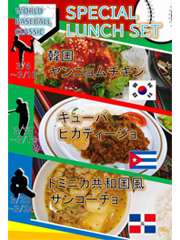
JICA Tokyo Restaurant is on the 1st floor of JICA Tokyo. You can reach there from the front entrance. Please check out the website to see what is available on the weekly menu!
Profile
ISHIKAWA Hiromu
Mr. Ishikawa is an employee of Tokyo Business Service Co., Ltd. His motto is "You must always to what you have to do." He once went to learn table manners by spending his own money. Behind the fact that he is adored by participants as a "father," there is a constant and diligent effort to provide a comfortable time for guests.
SHINDO Kazuhiro
Mr. Shindo is an employee of Tokyo Business Service Co., Ltd. and the chief of JICA Tokyo Restaurant. Working under the peculiar condition that people from a wide variety of countries are customers, he sometimes goes to Ameya Yokocho in Ueno or to Shinokubo to purchase spices used for the dishes of different countries, or visit the restaurants of various countries' cuisine in Tokyo and develops a recipe by discussing with his colleagues. He is always working diligently to provide a place and dishes to make the guests relaxed.





scroll